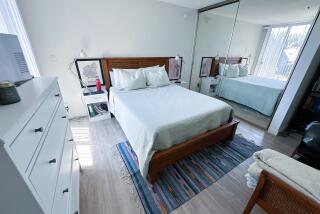It’s a renter’s market, but there are pitfalls
As you get ready to move out of Mom and Dad’s, some upfront leg work could save you many a headache.
In many cities around the country, especially in California, Florida and Arizona, it’s a renter’s market. Renters have more choices -- from traditional apartments to single-family homes -- and more bargaining power. But they should also be prepared to deal with first-time landlords, who have decided to lease a property they can’t sell in the current downturn.
Here are some tips to get you started:
* Set a budget.
Look at your income and expenses and determine how much you can afford to pay for rent. A good rule of thumb is spending no more than 30% of your monthly take-home pay. And don’t forget, some landlords include utilities in the rent, some don’t. Some also charge extra for parking and pets. Once you have a limit, you can start looking.
* Research your options.
Check websites such as craigslist.com and apartments.com, rental magazines and newspaper listings. Drive around the neighborhood you want to live in -- both during the day and at night. Ask family, friends and co-workers for recommendations. Once you have a few apartments in your sights, take the time to compare living spaces, amenities and prices.
Inspect the common areas of a property. If the hallways and elevators are dirty or the grounds overgrown, there’s a risk the landlord will also take a long time to make any repairs.
Ask some of the residents about the landlord or property manager. You might get details you wouldn’t hear otherwise, like odors from the restaurant next door or the upstairs neighbor’s dog that barks all day when the owner is away.
If you’re visiting apartments after work, make sure to come back during daylight, recommends Jimmi Circosta, an associate broker at Citi Habitats in New York. You can see how much natural lighting comes into the apartment instead of relying on a landlord’s word.
* Keep a priorities list.
What do you want most in your apartment? A large kitchen, a fireplace, many windows, a balcony or a big master suite? Take your pick, but determine what you could do without. And don’t forget the small things that could become bigger deals if you have to live with it every day.
“Check the water pressure. That can really drive some people nuts,” Circosta says.
Stroll or drive around the neighborhood. Where’s the nearest supermarket, dry cleaners and pharmacy? Is the neighborhood residential or amid a bustling downtown? Go out to dinner in the area to help make sure it fits you.
* Background checks, yours and theirs.
Once you’ve made your choice, walk into the leasing office prepared. Landlords or property managers will probably require at least some form of identification to pull your credit report and criminal background check, employment information.
The landlord may also ask you for a nonrefundable application fee.
Some stricter landlords could ask for recent pay stubs or a letter from your employer to verify your income. Apartment owners may ask for tax returns, the most recent bank statements, a reference letter from your current landlord and personal references.
If you’re renting from an individual, you can check out his or her financial situation by sifting through district court records for any foreclosure actions, judgments or bankruptcy filings.
You also can contact your local Better Business Bureau to see if there have been any complaints filed against the landlord.
* Ask for a discount.
Before signing anything, ask about any manager specials that may not be advertised, suggests Richard Snyder, president of R.A. Snyder Properties in San Diego.
“In the current environment that is becoming increasingly a renter’s market, you’re starting to see concessions such as move-in bonuses or money off the rent,” he says. Or some landlords might offer a lower rent if you sign a longer lease.
* Beware of extra charges, penalties.
Find out what’s included in the rent, such as heat, water, electricity or gas. Are there any extra charges for parking, pool, gym or pets? Can you make changes to the apartment? What’s the penalty for terminating early? In what cases can the landlord keep your security deposit? Is it a month-to-month or yearlong lease?
If the unit you want to rent has any damage or needs repairs, make sure the landlord addresses it in the lease, either by agreeing to fix it or your agreeing to live with it.
Double-check that the rent, the beginning date and expiration date on the lease are correct.
The landlord will probably ask you for the first month’s rent and security deposit, usually equal to at least one month’s rent. Often, landlords ask for certified bank checks.
And always, if you don’t understand something, ask. It’s better to look foolish before you sign on the dotted line than after.
More to Read
Inside the business of entertainment
The Wide Shot brings you news, analysis and insights on everything from streaming wars to production — and what it all means for the future.
You may occasionally receive promotional content from the Los Angeles Times.










